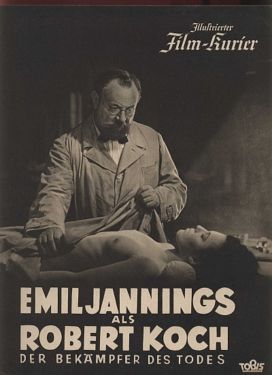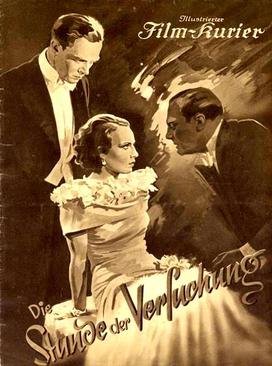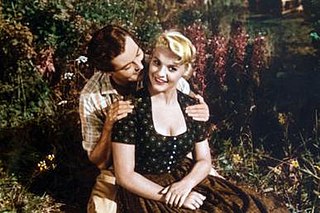Related Research Articles

The Solvay Conferences have been devoted to preeminent unsolved problems in both physics and chemistry. They began with the historic invitation-only 1911 Solvay Conference on Physics, considered a turning point in the world of physics, and are ongoing.
Speer und Er is a three-part German docudrama starring Sebastian Koch as Albert Speer and Tobias Moretti as Adolf Hitler. It mixes historical film material with reconstructions, as well as interviews with three of Speer's children, Albert Speer Jr., Arnold Speer and Hilde Schramm.
Zur Hölle mit den Paukern is a 1968 West German comedy film directed by Werner Jacobs and starring Hans Kraus, Theo Lingen and Günther Schramm. It was the first entry into the seven part Die Lümmel von der ersten Bank series of comedy films.
Hans (Johannes) Finohr was a German actor.

Carl Balhaus was a German stage and film actor. After the Second World War he worked as screenwriter and director for the East German state-owned studio DEFA. He was an uncle of the Academy Award nominated cinematographer Michael Ballhaus.
Michael von Newlinsky was an Austrian film actor who appeared in numerous supporting roles during his career, in films such as Georg Wilhelm Pabst's Pandora's Box (1929).

Robert Koch is a 1939 Nazi propaganda film directed by Hans Steinhoff and starring Emil Jannings, Werner Krauss and Viktoria von Ballasko. The film was a biopic of the German pioneering microbiologist Robert Koch (1843–1910). It was shot at the Johannisthal Studios in Berlin and premiered at the city's Ufa-Palast am Zoo. The film was made by the Tobis Film company, and was also distributed in the United States by the largest German studio UFA.

Johann Berenberg was a German merchant and banker. He was a co-owner of Berenberg Bank from 1748, with his brother, senator Paul Berenberg, and after the latter's death in 1768 the sole owner. The bank still bears his name. He was also noted as an art collector and held several public offices in the city-state of Hamburg.

Wenn die Musik nicht wär is a 1935 German drama film directed by Carmine Gallone and starring Paul Hörbiger, Willi Schaeffers and Ida Wüst. The film was shot at the Grunewald Studios in Berlin. It is based on the novel Der Kraft-Mayr by Ernst von Wolzogen. The film's art direction was by Fritz Maurischat and Karl Weber.

The Hour of Temptation is a 1936 German mystery film directed by Paul Wegener and starring Gustav Fröhlich, Lída Baarová and Harald Paulsen.
Heinrich Gies (1912–1973) was a German film and television actor.

Gertrud Meyen (1919–2012) was a German stage and film actress. She was also a voice actor, dubbing foreign-language films for release in Germany. She was married to the actor Heinz Engelmann.
Theo Shall (1896–1955) was a German stage and film actor. He was born in Metz when it was part of the German Empire but left following its occupation by France following the First World War.

Walter Jupé was a German actor, screenwriter and dramaturg.

Marriages Forbidden is a 1957 West German comedy film directed by Heinz Paul and starring Ingeborg Cornelius, Helga Franck and Siegfried Breuer. It was one of many heimatfilm made during the decade.

Daybreak is a 1954 West German drama film directed by Viktor Tourjansky and starring Hans Stüwe, Elisabeth Müller and Alexander Kerst.Filming took place at the Bavaria Studios. It was also shot on location in Munich and Hamburg. The film's sets were designed by the art director Arne Flekstad.
Margit Schramm was a German soprano in operetta, opera and song. She also appeared as a film actress and hosted a television show. In the 1960s, she became known as an operetta diva on stage, German television, in numerous concerts and in films, where she often appeared together with her favourite stage partner, the tenor Rudolf Schock.
Sky Hounds is a 1942 German war drama film directed by Roger von Norman and starring Malte Jaeger, Waldemar Leitgeb and Albert Florath.

In the Name of the People is a 1939 German crime film directed by Erich Engels and starring Rudolf Fernau, Fritz Kampers, and Rolf Weih. The film's sets were designed by the art directors Hans Sohnle and Wilhelm Vorwerg. It was shot at the Babelsberg Studios in Berlin.

My Son the Minister is a 1937 German comedy drama film directed by Veit Harlan and starring Hans Brausewetter, Heli Finkenzeller and Françoise Rosay.